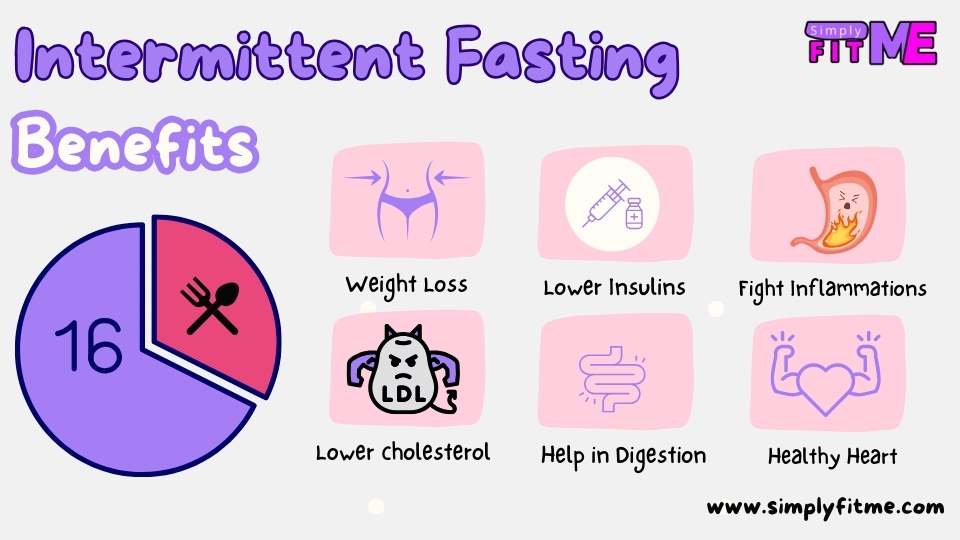The 16:8 plan is a type of intermittent fasting where you fast for 16 hours and eat during an 8-hour window. It’s designed to sync with your body’s natural rhythms.
How to Follow the 16:8 Plan
To start, choose a 16-hour period for fasting, which usually includes your sleep time. Common fasting windows are from 9 a.m. to 5 p.m. or noon to 8 p.m. It’s best to stick to regular meal times and avoid eating late at night.
Recommended Foods and Tips
When you’re eating, focus on nourishing foods like fruits, vegetables, lean proteins, and healthy fats. It’s important to stay hydrated, so drink plenty of water, tea, or coffee throughout the day. Try to maintain a regular eating schedule, be mindful of your meals, and incorporate physical activity into your routine.
Health Benefits of Intermittent Fasting
Following the 16:8 plan may help with weight loss, fat loss, and improving metabolic health, potentially reducing the risk of certain diseases.
Side Effects and Risks
Some people may experience headaches or fatigue when starting the 16:8 plan. It’s also important to avoid overeating during your eating window and be cautious if you have certain health conditions. Pregnant or breastfeeding individuals should not try this plan without consulting a healthcare professional.
Read also: Simply Fit Me 1400 Calorie Diet Plan for Weight Loss
Diabetes Management
While the 16:8 plan may be beneficial for some, it’s not recommended for individuals with type 1 diabetes. Those with prediabetes or type 2 diabetes should consult their healthcare provider before trying intermittent fasting.
7-Day Sample Diet Plan for 16:8 Intermittent Fasting
Day 1:
- 11:00 a.m. (Meal 1): Avocado toast with tomatoes and feta cheese, mixed berries.
- 2:00 p.m. (Snack): Greek yogurt parfait with granola.
- 4:30 p.m. (Meal 2): Grilled salmon, quinoa, roasted vegetables.
- 6:30 p.m. (Snack): Apple slices with almond butter.
Day 2:
- 11:00 a.m. (Meal 1): Spinach and feta omelette, whole grain toast, fruit salad.
- 2:00 p.m. (Snack): Cottage cheese with pineapple.
- 4:30 p.m. (Meal 2): Turkey stir-fry, brown rice.
- 6:30 p.m. (Snack): Carrot sticks with hummus.
Read also: How to lose Weight Without Diet and Exercise?
Day 3:
- 11:00 a.m. (Meal 1): Greek yogurt with honey and almonds, whole grain crackers.
- 2:00 p.m. (Snack): Sliced cucumber with tzatziki dip.
- 4:30 p.m. (Meal 2): Grilled chicken salad with mixed greens, vinaigrette dressing.
- 6:30 p.m. (Snack): Banana with peanut butter.
Day 4:
- 11:00 a.m. (Meal 1): Whole grain pancakes with berries and Greek yogurt.
- 2:00 p.m. (Snack): Almond butter on rice cakes.
- 4:30 p.m. (Meal 2): Baked tofu with stir-fried vegetables, brown rice.
- 6:30 p.m. (Snack): Sliced apple with cheese.
Read also: 9 Days Intermittent Fasting: Diet Plan & Workouts
Day 5:
- 11:00 a.m. (Meal 1): Scrambled eggs with spinach and mushrooms, whole wheat toast.
- 2:00 p.m. (Snack): Mixed nuts and dried fruit.
- 4:30 p.m. (Meal 2): Grilled shrimp with quinoa salad.
- 6:30 p.m. (Snack): Greek yogurt with honey.
Day 6:
- 11:00 a.m. (Meal 1): Oatmeal with sliced banana and nuts, boiled eggs.
- 2:00 p.m. (Snack): Veggie sticks with hummus.
- 4:30 p.m. (Meal 2): Baked chicken breast with roasted sweet potatoes, steamed broccoli.
- 6:30 p.m. (Snack): Berries with whipped cream.
Day 7:
- 11:00 a.m. (Meal 1): Breakfast burrito with scrambled eggs, black beans, and salsa.
- 2:00 p.m. (Snack): Greek yogurt with granola.
- 4:30 p.m. (Meal 2): Lentil soup with whole grain bread.
- 6:30 p.m. (Snack): Sliced pear with cheese.
Conclusion
The 16:8 intermittent fasting plan can be an effective way to manage weight and improve overall health. By following a balanced diet and sticking to a consistent eating schedule, you can reap the benefits of intermittent fasting while still enjoying delicious and satisfying meals. Remember to listen to your body and consult with a healthcare professional before making any significant changes to your diet or lifestyle.







